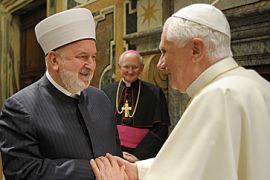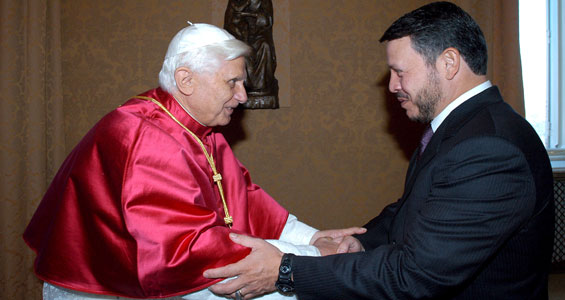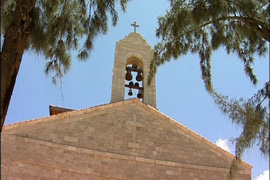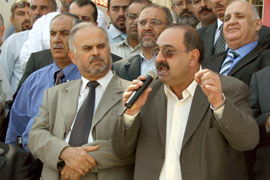Jordanians seek papal apology
Pope to speak to Muslim leaders about remarks in 2006 in first leg of Middle East tour.

 |
| Pope Benedict XVI and Jordan’s King Abdullah II first met in September 2005 [EPA] |
As Jordan’s Christians, who account for five per cent of the population, prepare to welcome Pope Benedict XVI to their country at the start of his first papal pilgrimage to the Middle East, the Muslim Brotherhood have renewed their criticism of the pontiff’s visit.
In 2006, the pope quoted a medieval text that characterised some of the teachings of the Prophet Mohammed as “evil and inhuman,” especially “his command to spread by the sword the faith.”
Since then, Jordan’s Brotherhood have been demanding the pope apologise for his remarks, which many Muslims interpreted as insulting to their faith.
The pontiff has said he was “deeply sorry” over the reaction to his speech, explaining that the passage he quoted did not reflect his own opinion.
However, Jamil Abu Bakr, a Brotherhood spokesman, says this is “insufficient” and falls short of a “clear public apology”.
Abu Bakr told Al Jazeera that Muslims “love Jesus Christ more than Christians do” and said if the Vatican went “against the Christian faith when it acquitted Jews of spilling Christ’s blood”, then an apology to the world’s Muslims is not too much to ask of the Holy See.
Visiting mosques
The pope is hoping to earn some plaudits when he visits the Al Hussein Bin Talal Mosque, the second such visit to a Muslim place of worship during his papacy. There, he will also discuss with Muslim leaders inter-faith dialogue and co-existence.
The pope’s visit to the mosque and the meeting with Muslim leaders is interpreted by some Jordanians as an indirect apology that would not undermine his papal credibility.
The Muslim Brotherhood, however, have been excluded from the dialogue in what they suspect is a move by the Jordanian authorities – and not the Vatican – to avoid any controversy or confrontation between the pontiff and the country’s largest opposition group.
Curbing the Muslim Brotherhood has typically been a strategy the Jordanian authorities have used in their of relations with the group.
Many in the Orthodox Christian community also believe the Vatican should apologise to Muslims in an effort to safeguard the peaceful inter-faith co-existence that has prevailed in Jordan.
Odeh Kawwas, an elected member of the Central Committee of the World Council of Churches and a former Christian MP, says apologies have been made by the Vatican to Jews over the Holocaust and, therefore, an apology extended to Muslims is necessary, particularly while the pope is on Jordanian soil.
Pilgrim of peace
 |
| The pope will not be visiting the Church of Madaba, a “treasured site” in Jordan |
The Pope will first visit the Regina Pacis centre for the handicapped and will then make a courtesy visit to the Jordanian royal family at the Al Husseini palace.
He will visit Mount Nebo where tradition holds that Moses saw the Promised Land from a distance. The pope will also bless the cornerstone of the Patriarchate of Jerusalem’s Madaba University.
He will also celebrate a mass at the international stadium in Amman, where 30,000 people are expected to attend. He will visit Bethany Beyond the Jordan, site of Jesus’ baptism and will bless the foundation stones of the Latin and Greek-Melkite churches.
But some Arab Christians in Jordan also have reservations about Pope Benedict’s visit believing it to be a political move. Kawwas says not including the Church of Madaba, “one of Jordan’s most treasured Christian and tourists sites, on the itinerary is unacceptable”; he believes it was left out because it is an Orthodox house of worship.
Like many who question the Papal pilgrimage across the Middle East, Kawwas also criticised the pope’s eagerness to visit Israel on May 11 but not the Gaza Strip. The pontiff will, however, visit the occupied West Bank on May 12.
The pope says he is visiting the Holy Land as a pilgrim of peace in a region plagued by violence, injustice, mistrust and fear.
The Vatican described the papal pilgrimage as the “most awaited and perhaps most challenging trip so far” of Benedict’s papacy because of the uncertain political situation in the area and the fragile prospects for peaceful conflict resolution.
“Most challenging trip”
 |
| Odeh Kawwas says many Christians in Jordan also want the Pope to apologise [EPA] |
Pope Benedict’s pilgrimage will be the third papal visit to the region after Pope Paul VI’s in 1964 and Pope John Paul II’s in 2000.
An estimated 10,000 delegates are expected to come to Jordan, the first leg of the pope’s pilgrimage to the Middle East; the visitors will range from ordinary Christian worshippers to senior clergymen.
Jordanian tourism authorities are trying to ensure a smooth stay for the thousands of visitors expected to flock from Arab and foreign countries, explaining that they believe the papal visit will boost tourism in the country this year.
Jordan makes an annual $3 bn from tourism and the sector comprises 14.4 per cent of the country’s GDP.
But because of the global economic downturn, the country has lost its main markets in the US and Europe as tourists opt to stay at home.
Tourism authorities are counting on media coverage – more than 1,270 journalists are covering the pontiff’s visit – to promote Jordan’s religious sites and help attract more tourists.
The Jordanian government says it is taking the visit very seriously to reach its economic objectives this year and to present itself as a model for inter-faith co-existence and peace in the region.